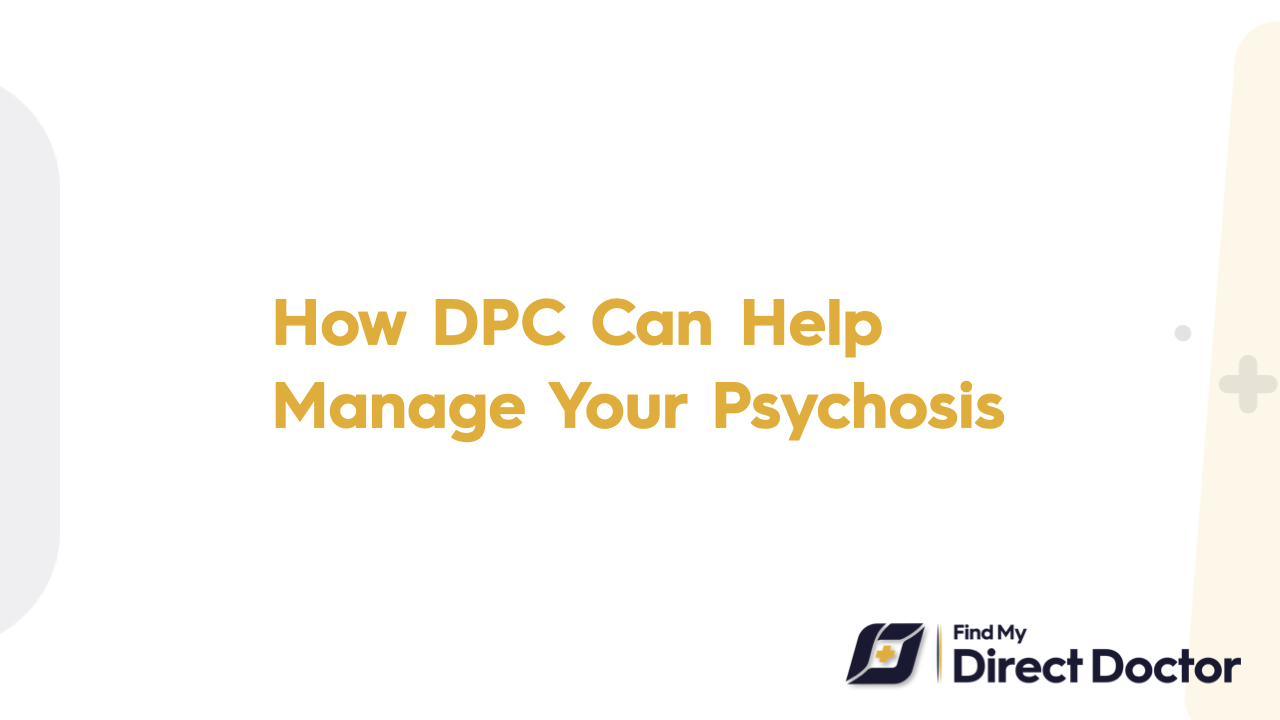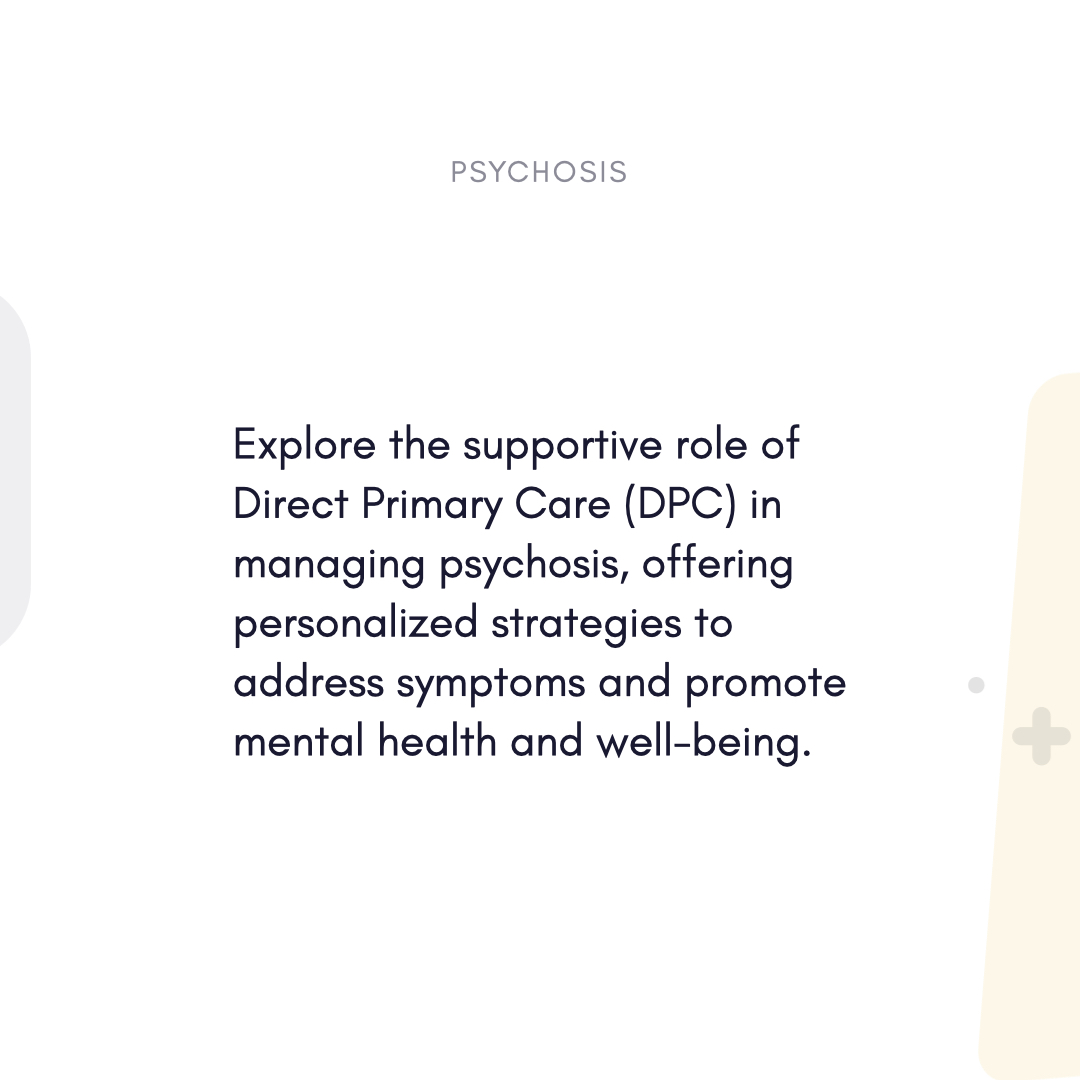Psychosis and Direct Primary Care (DPC): Compassionate, Continuous Care for Stability and Recovery
Voices that nobody else picks up. Paranoia separating you from the world. For three percent of individuals suffering with psychosis, this departure from reality is frightening and stigmatizing. Though there is hope: Direct Primary Care (DPC) offers a safe, continuous partnership to manage symptoms and rebuild lives. Traditional mental health care often means long waits and scattered treatment.

Managing Psychosis
A disconnection from reality, psychosis presents symptoms including:
- Hallucinations are: Seeing objects and hearing voices
- Mistakes: Fixed false ideas (e.g., grandeur, persecution, guilt)
- Thought and speech that is disorganized
- Negative manifestations: Social disengagement, flat influence
Common reasons:
- Schizophrenia; bipolar illness
- Severe depression with psychotic traits
- Medical diseases or drug use (meth, LSD)
Therapeutic risks: Self-neglect, homelessness, incarceration Early intervention, stressed by the American Psychiatric Association, helps to enhance long-term results.
DPC Revolutionizes Psychiatric Treatment
Usually costing 100 USD–300 USD per month, Direct Primary Care (DPC) runs on a membership model and provides flat fee access to your physician. This translates for psychosis patients into no co-pays, no ER delays, and a care plan as consistent as your needs.
1. Early Intervention and Crisis Preventing Strategies
The easily available model of DPC guarantees:
- 24/7 telehealth during paranoia or command hallucinations.
- Same-day assessments for newly onset conditions.
- Coordinating with psychiatrists for antipsychotic trials means quick referrals.
2. Customized, evidence-based treatment
DPC doctors design customized plans compliant with APA standards:
- Medication management: Atypicals (risperidone, aripiprazole) with genetic efficacy testing.
- Integrating CBT for psychosis (CBTp) referrals or internal counseling.
- Focus of comorbidity: tracking antipsychotic metabolic syndrome.
3. Complete, Reasonably Priced Support
DPC lowers social and financial risks by:
- Cutting prescription costs: For generics, wholesale pricing (10 USD vs. 200 USD monthly).
- Teaching early warning signs and de-escalation strategies helps families.
- Community resources: references for vocational rehabilitation, housing aid.
DPC's advantages for psychosocial patients
1. Inappropriate Accessibility
- Direct provider access in times of crisis, so avoiding police intervention.
- No waiting for therapy sessions or antipsychotic changes.
2. Customised Interventions
- Early clozapine trials to prevent chronicity first-episode psychosis.
- Substance-induced: dual diagnosis and coordinated detox.
3. Open Affordable Cost
- Membership consists in consultations, basic labs, and care coordination—no hidden costs.
- Typical savings: 5,000 USD+ yearly from avoiding ER trips and hospitalizations.
Personal Success Stories from Real Life
- Case 1: Using daily check-ins and long-acting injectable risperidone, 22-year-Alex with schizophrenia avoided jail. Now living in supportive housing, steady.
- Case 2: Maria, 35, who had bipolar psychosis, went into remission with family therapy and DPC-coordinated lithium monitoring.
Questions and Answers: DPC and Psychosis
- Q: Could DPC manage forced hospitalizations?
- A: DPC doctors guarantee continuity after discharge by kindly organizing emergency petitions.
- Q: Is DPC within reach for uninsured patients?
- A: Definitely. Medication help programs and sliding scale fees help to make care possible.
- Q: What about case management or therapy?
- A: A DPC works with psychologists and social workers to get cash-pay discounts.
Why DPC Is a Win for Psychosis Patients
Emphasizing DPC's alignment with recovery-oriented care, the National Alliance on Mental Illness (NAMI) supports:
- Early therapy will help to lower relapse rates.
- Tools for tracking symptoms and wellness programs help empower you.
- Trust: Replacing revolving-door psychiatry is a consistent care team.
Create stability and hope once more.
Psychosis does not have to equate with a lifetime of anarchy. Using DPC, you find a partner who walks with you toward clarity one step at a time, intervenes with knowledge, and listens without judgment.






